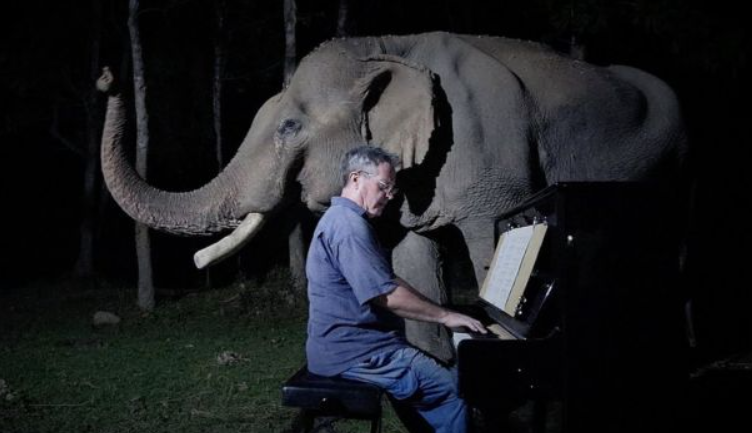A skilled pianist sat in front of the keys, his fingers moving with effortless elegance. But this was no average audience; before him stood a 61-year-old elephant, a soul wounded by a lifetime of adversity. Forced to pull wood in the Thai forest, his body exhibited the wounds of severe labor—his frame distorted, his right eye gone, and his tusk taken via torture.

However, when the opening chords of Moonlight Sonata filled the air, something unexpected occurred. The weary giant remained quiet, his aged ears twitching and his tired eyes softening. In that moment, Beethoven’s masterpiece became more than just music; it was a salve for a broken spirit, a rare moment of calm for a soul that had only known pain. Perhaps Beethoven never expected his composition to have such a profound effect on the heart of an elephant.
Paul Barton performs Beethoven’s ‘Moonlight Sonata’ for an elderly elephant in the Thai bush.
Mongkol, a 61-year-old elephant, has spent most of his life in confinement, dragging trees. Unfortunately, the severe task resulted in the loss of his right eye and tusk. Fortunately, he was rescued and transported to Elephants World, where he could live out his days in peace and freedom along the River Kwai in Thailand. Mongkol, known for his soft and sensitive temperament, has a special affinity for music.
Paul Barton, a self-taught and classically educated performer, performs Beethoven’s ‘Moonlight Sonata’ for him in this poignant exchange. Barton had originally traveled to Thailand for three months to teach piano at a private school. It was here that he met his wife, another wildlife artist and animal enthusiast. After 22 years living in Thailand, the couple decided to make it their permanent home.
Paul Barton’s serenade to Mongkol provides a lovely moment of interspecies interaction, demonstrating music’s universal appeal.